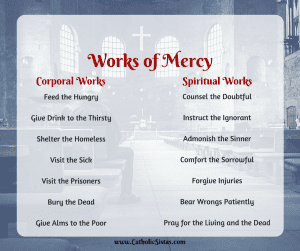
Not long ago, I attended an event where an icebreaker game was played. The icebreaker was to count up how many Sacramentals we had on each of us, and whomever at the table had the most won a prize. I happened to be at the table with our chaplain, who gave us a run for our Sacramentals, until he was told he had his own gift set aside for him.
Before he had stepped out of winning the Sacramentals game, our chaplain posed to us, “Do you think each individual is a Sacramental? Because, I count all of you as a Sacramental,” as he tried to tally us up as some of the Sacramentals he brought to the table.
His question, while posed in jest, has stuck with me several months later.
The Catechism of the Catholic Church (CCC) states in 1677,
Sacramentals are sacred signs instituted by the Church. They prepare men to receive the fruit of the sacraments and sanctify different circumstances of life.
Every baby baptized into the Catholic Church has been anointed and sealed with the Holy Spirit. At Confirmation, that child takes on a conscious decision to reaffirm the baptismal vows their parents typically, initially undertook on behalf of the child. And, the individual then becomes re-anointed and re-sealed with the Holy Spirit.
In essence, our chaplain was correct – we do become Sacramentals. We become a living, breathing, walking “sacred sign instituted by the Church,” to spread the Good News and the Joy of the Gospel.
Knowing we are sacred signs, what are we doing with that knowledge? Are we hiding our light under the bushel so as to not attract attention? If so, how do we get back on course?
I once confided to another Army chaplain that I wasn’t cut out for evangelizing. The “E word” scared me, and I was afraid I was too immature in my Faith to be able to defend it against questions. He chuckled at me, and asked me if I was a mother. I looked at him strangely, and answered in the affirmative because my oldest at the time was a year and a half old. He then shared that evangelization as a mother or father looks a little different than evangelization of others – by virtue of teaching our children their prayers, we are evangelizing. By ensuring our children go to church, we are evangelizing. By living and encouraging the Works of Mercy, as identified by the United States Council of Catholic Bishops (USCCB), we are evangelizing.

Being a sacred sign comes with responsibility. Part of that responsibility is to our neighbor – to the soul we see next to us… looking past the physical presence before us, to recognize the soul behind the eyes. The Works of Mercy are such a beautiful, powerful reminder of the stepping stones to living as the hands and feet of Christ.
The saints are prime examples of having the faith and trust in God to recognize God’s children in those suffering, destitute, and in need. St. Francis of Assisi embraced a leper shortly after his conversion, while amazed at how his former self would have been repulsed to see someone else do the same. St. Damien of Moloka’i, and St. Marianne Cope would go on to not just embrace lepers, but to live amongst them, and tenderly care for them. The list of saints who lived the Works of Mercy can go on for days!
Through Christ, we get the promise of entering Heaven. Yet, in order to truly pass through Him, we are challenged to meet Him on the road, to recognize Him in others, and to extend His reach through us, to another person.
And, the Church, in her infinite love and wisdom, has shown us how to do this through the Works of Mercy. While we may no longer be in the Extraordinary Jubilee Year of Mercy, we are still called to extend mercy to those in our lives – whether they are family, friends, or complete strangers.
So, as we enter Advent this year, I encourage all of us to spend some time focusing on how we are a living Sacramental. Commit to a Work of Mercy each day during Advent, knowing you’ll repeat some several times. Don’t be afraid to take the Good News and Joy of the Season to those to whom you may initially be afraid to reach out.
Recognize Christ in your neighbor, and better yet, be Christ to others.
It is our duty and our sacred responsibility.
